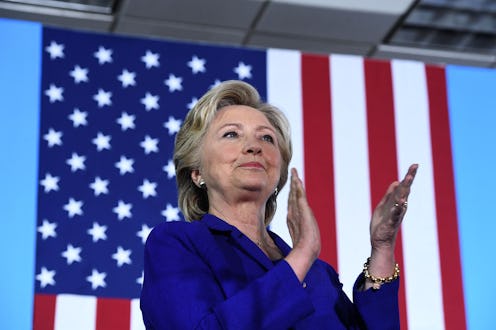News
Young Voters Turned Out For Clinton
After more than a year of campaigning, Hillary Clinton won the support of millions of voters across the country on Tuesday, despite losing to Donald Trump in the presidential election. She made history as the first female candidate to appear at the top of a major-party ticket for the White House — but she didn't do it alone. According to Tuesday's election data, a majority of millennials voted for Clinton, supporting her version of "Herstory" on the big day.
In total, more than 59 million voters cast their ballots for Clinton on or before Election Day. She even managed to win the popular vote, beating Trump by more than 100,000 votes. Throughout the course of her campaign, Clinton was sometimes branded as having a "millennial problem," as Heavy has reported, but she was still expected to turn out more young voters than her Republican challenger. On Election Day, she earned their support in droves, but she still didn't win over enough of them.
Exit poll data, which was collected at polling places across the country on Election Day, showed just how high/low millennial support for Clinton was. According to the data reported by CNN, Clinton won 54 percent of the millennial vote, compared with Trump's 37 percent. She steadily beat Trump in terms of millennial support, but she didn't turn out as large a portion of the young electorate as President Obama did in 2012 — and that turned out to be a pivotal weakness of Clinton's campaign.
In the past, young voters have been key to Democratic victories. In 2012, for instance, President Obama won 67 percent of the young vote, according to Politico. The margin between Obama's 67 percent and Mitt Romney's 30 percent of the young vote was significant: A Tufts University study revealed that if Romney had managed to split the young vote with Obama in just a small number of states, he could have won those states and, perhaps, the presidency.
In that 2012 election, around 23 million millennials reportedly voted, or half of the voting-eligible population between the ages of 18 and 29. While significant, that percentage is lower than the percentage of members of other generations who vote. For instance, according to NPR, 72 percent of the so-called Silent Generation, those voters over 70 years old, voted in the 2012 election. In other words, low voter turnout among young people has become a mark of American elections, even with the enthusiasm that surrounded Obama's campaigns in 2008 and 2012.
This time around, there were more millennials than members of any other generation at stake. In April, Pew Research Center reported that millennials had overtaken baby boomers as the largest generation in the country. In the end, if millennials had decided the election, the president-elect would be female.
